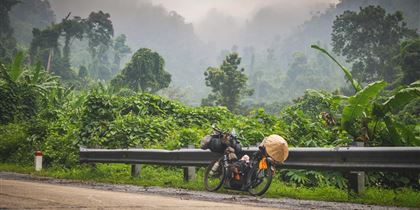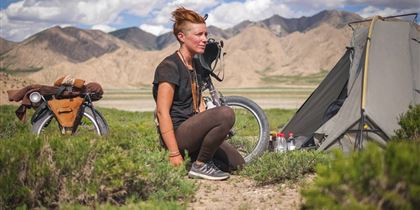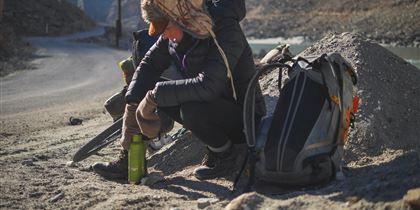La Trottineuse. Diary Notes from a World Tour by Scooter. Part 3.
| RedakceThree and half years of kicking and living on the Road throughout Eurasia had led Blandine to the gates of Australia. She had spent the last months running against the clock on main roads across burning, humid and overpopulated South East Asia, circumstances which she found were not allowing for a proper experiment of the simple good life. Leaf through her travel log with us and take a look at how she is doing on remote Australian trails.

Senseless fights
Looking back on South-East Asia
Nearly 8 months and thousands of miles of a tropical crossing. I explored South East Asia a bit in soldier of fortune mode, often kicking against the clock. I saw and lived the other side of the western touristic dream, it is what I wanted. Conditions were tough, sometimes pretty hard for me who cherishes solitude, desert and open spaces. I am overcoming it, tired indeed, but enriched with a supplementary slice of knowledge about a part of the world, its inhabitants and cultures.
The Indonesian track stops in Denpasar today, from where I will fly to Darwin tomorrow. A big heartily thank you to all of you, who have supported me throughout the Laotian, Vietnamese, Cambodian, Thai, Malaysian and Indonesian lands.
I had learnt from the Road that there are meaningful ordeals but also senseless fights. Some struggles seemed worth leading beyond preconceived boundaries whilst others felt like a waste of time and a loss of humanity.
I missed the desert of Western China, the Celestial Mountains of Central Asia, the golden landscapes of Persia.
Perhaps because I, too, was a wanderer, did I miss the sense of freedom of historically pastoralist and nomadic people.
Australia had thus been lying afar as a promised land. Starting from Darwin, I decided to kick around the continent and tackle some challenging tracks along the way, the time had come to get back to the substance of my initial quest.
A Western philosopher had come up with the idea that space and time are pre-existent glasses, with which we experience the world. For him, they were given a priori as forms of the sensibility.
In fact, once outdoors, speculation was part of the ambulation, thoughts integrated in a physical movement, often an intense effort. Deciding if Kant's position on knowledge was relevant was not a key issue anymore.
For the simple life of a self-propelled peregrine would immediately place one on another ground, that of action, of ethics. It was a practical quest of every moment for the fair measure of a human life, balanced with the peers, the territories and the realms of beings and things. As I had experienced, a well led quest was also the path to freedom and felicity.
Yet, space and time seemed of the essence when it came to freedom. Whenever I had been limited in time and restricted in itineraries it seemed that I had lost the path of the good life and was thrown into one of those senseless fights.
Although Blandine was opposed to flying by aeroplane and had first intended to travel to Australia by boat, she eventually used airline services. She did not want to struggle in the humid tropics and on overcrowded roads of South-East Asia for another three to four months, before the cyclone season would pass.
The good life required a certain quality of time and a certain quality of space to be exercised daily. It was a kind of training that needed time to unfold and be maintained and it needed a particular ground to root in.
Norway and Finland, for that matter, as well as Turkey, were the golden ages of my journey. I had explored and lived amongst their lands in the first and second years. Would Australia offer the background conditions I deemed essential as well?
Soon, I became aware that another question was haunting the former. Was it possible for a contemporary self-propelled traveller, past a certain point of his journey into the productivist world, to be able to experience that felicity ever again? Or was the ability to freedom only an early stage in the exploration of a human world which general course seemed doomed?



To be with those I like
“I have learned that to be with those I like is enough” ― Walt Whitman. There is that, and the Road. A familial encounter after two years of itinerancy throughout Eurasia: precious hours spent with dear ones give very unique energy. We will probably meet again in a few years now. Happy Easter week-end and festivities to everyone!
Water
One never feels more thirsty than when one should absolutely not be thirsty. On top of the logistics of transportation and resupply, there are two human challenges which arise when water becomes a key factor in a human powered adventure: one is to give enough water to the body but not too much, the other one is the struggle against the psychological obsession of the upcoming lack of water (an anticipation that makes one very thirsty).
I have already crossed two famous deserts: the Iranian Dasht-e Kavir and the great Taklamakan in the far West of China. But the Australian challenge will be of another level, where I plan on exploring trails, often mythical, pretty far from sealed roads and highways. I will often have to progress slowly for many days in a row without any supply points, on dirt tracks. Still in Darwin, I am taking my time to revise my priorities, my navigation system and my setup. Have a nice Sunday!
Natural elements
Sometimes there is not much you can do about the natural elements. Yesterday after I had drunk that tea on fire, a torrential downpour played me like a beginner. I had to fight it soaked wet and in the dark. A few hours ago in the savanna I could only find refuge behind a giant termite mound, perfect against horizontal rain, till water ran high at my feet. Tonight my camp is set on rocky soil and near the road but it is elevated. There are often multiple factors to weigh, there are also changing priorities. Especially after an ill managed night of downpour! Who knows what tonight will bring.



Food!
That's roughly my supplies for a few weeks and hundreds of mile on dirt and in remote territories. Sparse roadhouses are hardly any supply points as they generally serve hot meals and when there is a small cereal bag, it is three time the price.
From right to left, what lasts only 2/3 days to what can last for 2/3 weeks. Fruits, breads and crackers, first stock of oats and carrots, then dried fruits, dates and nuts, peanut butter, coupled in the evening with couscous, lentils, pastas and spices, coffee and tea. At the end of the course, last supplies are generally oats and treasured secret weapon Weet-Bix (second box). Of course, first days are hard work pushing everything but joy at the campfire, and as the time goes by, one diminishes the treats, counts the nuts, but is also much more at ease to push everything :)
I do not gravitate towards freeze-dry products which certainly have their advantage on punctual expeditions, because it would make poor sense for me, on a long-termed life on the road, they are expensive, and I want to keep a minimum pleasure in "cooking", though it is far from what I would eat were I growing my own food.
Let's not forget the unexpected donations along the way and successful dumpster diving on the trails!


A piece of humanism in my bags
This morning in Tom Price, I nearly randomly got acquainted with the incredible team of the Nintirri Centre, acting in favour of local communities, towards family matters, women, as well as bringing art and culture to everyone.
In fact, Stacey literally came to get me out of the street where I was kicking round desperately looking for a place to get new shoes. She invited me with unmatched goodness into the building, and also introduced me to other team members, committed women like her, full of splendid will and altruism. I went away without shoes despite their help, but with such a piece of humanism in my bags... Thank you!

La Trottineuse
More photos and information can be found on Blandine's website: www.wot.latrottineuse.com You can also follow it through Facebook www.facebook.com/latrottineuse.





